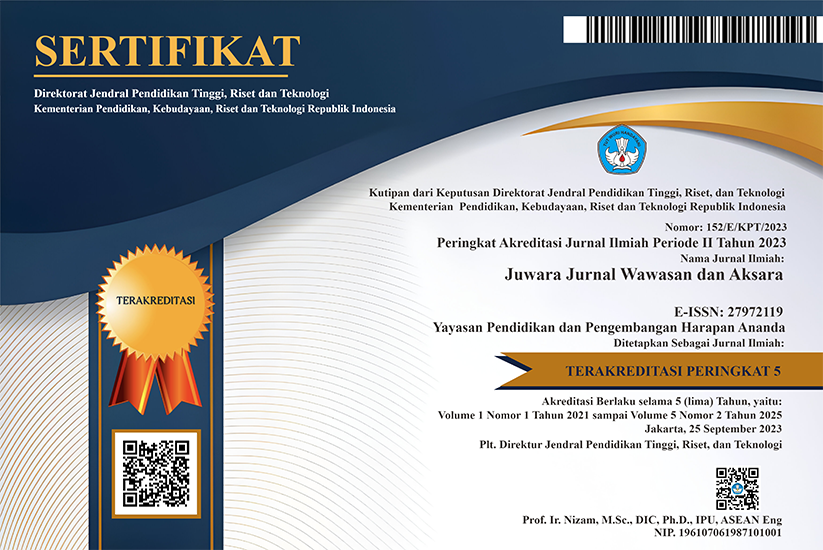Etika dalam Pengembangan Artificial Intelligence: Tinjauan Pedoman dan Penerapannya
DOI:
https://doi.org/10.58740/juwara.v4i1.271Keywords:
kecerdasan buatan, etika, pedoman, artificial intelligence, ethics, guidelinesAbstract
ABSTRAK
Kemajuan dalam pengembangan kecerdasan buatan (AI) telah memunculkan berbagai diskusi terkait aspek etika teknologi ini. Banyak pedoman etika diterbitkan untuk memastikan AI dikembangkan dan digunakan dengan cara yang bertanggung jawab, dengan fokus pada privasi, keadilan, transparansi, dan keamanan. Teknologi AI yang semakin "disruptif" membuat aturan etika ini menjadi sangat penting. Penilitian ini meninjau dan membandingkan 22 pedoman etika AI. Peneliti menemukan bahwa meskipun banyak prinsip yang tumpang tindih, ada kekurangan di beberapa pedoman, terutama terkait keadilan sosial dan penerapan dalam praktik. Penilaian ini menunjukkan bahwa prinsip etika seringkali tidak sepenuhnya diterapkan di lapangan, meski pedoman-pedoman tersebut telah disusun dengan baik. Kurangnya implementasi yang tepat bisa menimbulkan masalah serius di masa depan, terutama karena AI sangat berpengaruh dalam berbagai aspek kehidupan seperti pekerjaan, pendidikan, dan kesehatan. Oleh karena itu, evaluasi mendalam diperlukan untuk memperbaiki pendekatan etika AI. Penulis menyarankan beberapa langkah perbaikan, termasuk peningkatan transparansi dan akuntabilitas dalam pengembangan AI, serta penerapan pedoman etika yang lebih konsisten. Dengan memperkuat prinsip-prinsip ini, diharapkan AI dapat dikembangkan dan digunakan dengan lebih etis, membawa manfaat maksimal bagi masyarakat.
ABSTRACT
Progress in the development of artificial intelligence (AI) has given rise to various discussions regarding the ethical aspects of this technology. Many ethical guidelines are published to ensure AI is developed and used in a responsible manner, with a focus on privacy, fairness, transparency, and security. AI technology is increasingly "disruptive" making these ethical rules very important. This research reviews and compares 22 AI ethical guidelines. Researchers found that while many of the principles overlap, there are gaps in some of the guidelines, particularly regarding social justice and application in practice. This assessment shows that ethical principles are often not fully implemented in the field, even though the guidelines are well developed. Lack of proper implementation could cause serious problems in the future, especially because AI is very influential in various aspects of life such as work, education, and health. Therefore, in-depth evaluation is needed to improve AI ethical approaches. The authors suggest several steps for improvement, including increased transparency and accountability in AI development, as well as more consistent implementation of ethical guidelines. By strengthening these principles, it is hoped that AI can be developed and used more ethically, bringing maximum benefits to society.
References
Anderson, M., & Anderson, S. L. (Eds.). (2011). Machine ethics. Cambridge: Cambridge University Press.
Anderson, M., Anderson, S. L. (2015). Towards ensuring ethical behavior from autonomous systems: A case-supported principle-based paradigm. In Artificial intelligence and ethics: Papers from the 2015 AAAI Workshop (pp. 1–10).
Anderson, D., Bonaguro, J., McKinney, M., Nicklin, A., Wiseman, J. (2018). Ethics & algorithms toolkit. dalam https://ethicstoolkit.ai/. Diakses 1 February 2023.
Anderson, K., Waxman, M. C. (2013). Law and ethics for autonomous weapon systems: Why a ban won’t work and how the laws of WAR can. SSRN Journal, 1–32.
Awad, E., Dsouza, S., Kim, R., Schulz, J., Henrich, J., Shariff, A., et al. (2018). The moral machine experiment. Nature, 563(7729), 59–64.
Bakewell, J. D., Clement-Jones, T. F., Giddens, A., Grender, R. M., Hollick, C. R., Holmes, C., Levene, P. K. et al. (2018). AI in the UK: Ready, willing and able?. Select committee on artificial intel- ligence (pp. 1–183).
Baron, B., Musolesi, M. (2017). Interpretable machine learning for privacy-preserving pervasive systems. arXiv (pp. 1–10).
Beijing Academy of Artificial Intelligence. (2019). Beijing AI principles dalam https://www.baai.ac.cn/blog/beijing-ai-principles. Diakses 18 Juni 2023.
Bendel, O. (2017). The synthetization of human voices. AI & SOCIETY - Journal of Knowledge, Culture and Communication, 82, 737.
Boddington, P. (2017). Towards a code of ethics for artificial intelligence. Cham: Springer.
Brundage, M., Avin, S., Clark, J., Toner, H., Eckersley, P., Garfinkel, B., Dafoe, A. et al. (2018). The malicious use of artificial intelligence: Forecasting, prevention, and mitigation. arXiv (pp. 1–101).
Burton, E., Goldsmith, J., Koening, S., Kuipers, B., Mattei, N., & Walsh, T. (2017). Ethical considera- tions in artificial intelligence courses. Artificial Intelligence Magazine, 38(2), 22–36.
Calo, R. (2017). Artificial intelligence policy: a primer and roadmap. SSRN Journal, 1–28.
Cutler, A., Pribi?, M., Humphrey, L. (2018). Everyday ethics for artificial intelligence: A practical guide for designers & developers dalam https://www.ibm.com/watson/assets/duo/pdf/everydayethics.pdf. Diakses 4 February 2023.
DeepMind. DeepMind ethics & society principles. dalam https://deepmind.com/appli ed/deepmind-ethics-society/principles/. Diakses 17 Juli 17 2023.
Eckersley, P. (2018). Impossibility and uncertainty theorems in AI value alignment or why your AGI should not have a utility function. arXiv (pp. 1–13).
Engelmann, S., Chen, M., Fischer, F., Kao, C., Grossklags, J. (2019). Clear sanctions, vague rewards: How China’s social credit system currently defines “Good” and “Bad” behavior. In Proceedings of the conference on fairness, accountability, and transparency—FAT* ‘19 (pp. 69–78).
Ernest, N., & Carroll, D. (2016). Genetic fuzzy based artificial intelligence for unmanned combat aerial vehicle control in simulated air combat missions. Journal of Defense Management.
Etzioni, A., & Etzioni, O. (2017). Incorporating ethics into artificial intelligence. The Journal of Ethics, 21(4), 403–418.
Fjeld, J., Hilligoss, H., Achten, N., Daniel, M. L., Feldman, J., Kagay, S. (2019). Principled artificial intelligence: A map of ethical and rights-based approaches dalam https://ai-hr. cyber.harvard.edu/primp-viz.html. Diakses 17 Juli 2023.
Frey, C. B., Osborne, M. A. (2013). The future of employment: How susceptible are jobs to computerisa- tion: Oxford Martin Programme on Technology and Employment (pp. 1–78).
Fryer-Biggs, Z. (2018). The pentagon plans to spend $2 billion to put more artificial intelligence into its weaponry dalam https://www.theverge.com/2018/9/8/17833160/pentagon- darpa-artificial-intelligence-ai-investment. Diakses 25 Januari 2023.
Garzcarek, U., Steuer, D. (2019). Approaching ethical guidelines for data scientists. arXiv (pp. 1–18).
Gebru, T., Morgenstern, J., Vecchione, B., Vaughan, J. W., Wallach, H., Daumeé, III, H., Crawford, K. (2018). Datasheets for datasets. arXiv (pp. 1–17).
Gilligan, C. (1982). In a different voice: Psychological theory and women’s development. Cambridge: Harvard University Press.
Goldsmith, J., Burton, E. (2017). Why teaching ethics to AI practitioners is important. ACM SIGCAS Computers and Society (pp. 110–114).
Google. (2018). Artificial intelligence at Google: Our principles dalam https://ai.google/principles/. Diakses 24 Januari 2023.
Google. (2019). Perspectives on issues in AI governance (pp. 1–34) dalam https://ai.google/static/documents/perspectives-on-issues-in-ai-governance.pdf. Diakses 11 Februari 2023.
Gotterbarn, D., Brinkman, B., Flick, C., Kirkpatrick, M. S., Miller, K., Vazansky, K., Wolf, M. J. (2018). ACM code of ethics and professional conduct: Affirming our obligation to use our skills to ben- efit society (pp. 1–28) dalam https://www.acm.org/binaries/content/assets/ about/acm-code-of-ethics-booklet.pdf. Diakses 1 February 2023.
Greene, D., Hoffman, A. L., Stark, L. (2019). Better, nicer, clearer, fairer: A critical assessment of the movement for ethical artificial intelligence and machine learning. In Hawaii international confer- ence on system sciences (pp. 1–10).
Holdren, J. P., Bruce, A., Felten, E., Lyons, T., & Garris, M. (2016). Preparing for the future of artificial intelligence (pp. 1–58). Washington, D.C: Springer.
Howard, P. N., Kollanyi, B. (2016). Bots, #StrongerIn, and #Brexit: Computational propaganda during the UK-EU Referendum. arXiv (pp. 1–6).
Hursthouse, R. (2001). On virtue ethics. Oxford: Oxford University Press. Information Technology Industry Council. (2017) dalam https://www.itic.org/public-policy/ITIAIPolicyPrinciplesFINAL.pdf. Diakses 29 Januari 2023.
Jobin, A., Ienca, M., & Vayena, E. (2019). The global landscape of AI ethics guidelines. Nature Machine Intelligence, 1(9), 389–399.
Johnson, D. G. (2017). Can engineering ethics be taught?. The Bridge, 47(1), 59–64.
King, T. C., Aggarwal, N., Taddeo, M., & Floridi, L. (2019). Artificial intelligence crime: An interdisci- plinary analysis of foreseeable threats and solutions. Science and Engineering Ethics, 26, 89–120.
Kramer, A. D. I., Guillory, J. E., & Hancock, J. T. (2014). Experimental evidence of massive-scale emo- tional contagion through social networks. Proceedings of the National Academy of Sciences of the United States of America, 111(24), 8788–8790.
Lazer, D. M. J., Baum, M. A., Benkler, Y., Berinsky, A. J., Greenhill, K. M., Menczer, F., et al. (2018).The science of fake news. Science, 359(6380), 1094–1096.
McAllister, A. (2017). Stranger than science fiction: The rise of A.I. interrogation in the dawn of autono- mous robots and the need for an additional protocol to the U.N. convention against torture. Minne- sota Law Review, 101, 2527–2573.
McNamara, A., Smith, J., Murphy-Hill, E. (2018). Does ACM’s code of ethics change ethical decision making in software development?” In G. T. Leavens, A. Garcia, C. S. P?s?reanu (Eds.) Proceed- ings of the 2018 26th ACM joint meeting on european software engineering conference and sym- posium on the foundations of software engineering—ESEC/FSE 2018 (pp. 1–7). New York: ACM Press.
Microsoft Corporation. (2019). Microsoft AI principles dalam https://www.micro soft.com/en-us/ai/our-approach-to-ai. Diakses 1 February 2023.
Mittelstadt, B., Russell, C., Wachter, S. (2019). Explaining explanations in AI. In Proceedings of the con- ference on fairness, accountability, and transparency—FAT* ‘19 (pp. 1–10).
O’Neil, C. (2016). Weapons of math destruction: How big data increases inequality and threatens democracy. New York: Crown Publishers.
OpenAI. (2018). OpenAI Charter dalam https://openai.com/charter/. Diakses 17 Juli 2023.
Organisation for Economic Co-operation and Development. (2019). Recommendation of the Council on Artificial Intelligence (pp. 1–12) dalam https://legalinstruments.oecd.org/en/ instruments/OECD-LEGAL-0449. Diakses 18 Juni 2023.
Partnership on AI. (2018). About us dalam https://www.partnershiponai.org/about/. Diakses 25 Januari 2023.
Pekka, A.-P., Bauer, W., Bergmann, U., Bieliková, M., Bonefeld-Dahl, C., Bonnet, Y., Bouarfa, L. et al. (2018). The European Commission’s high-level expert group on artificial intelligence: Ethics guidelines for trustworthy ai. Working Document for stakeholders’ consultation. Brussels (pp.1–37).
Prates, M., Avelar, P., Lamb, L. C. (2018). On quantifying and understanding the role of ethics in AI research: A historical account of flagship conferences and journals. arXiv (pp. 1–13).
Schneier, B. (2018). Click here to kill everybody. New York: W. W. Norton & Company.
Selbst, A. D., Boyd, D., Friedler, S. A., Venkatasubramanian, S., Vertesi, J. (2018). Fairness and abstrac- tion in Sociotechnical Systems. In ACT conference on fairness, accountability, and transparency (FAT) (vol. 1, No. 1, pp. 1–17).
Sitawarin, C., Bhagoji, A. N., Mosenia, A., Chiang, M., Mittal, P. (2018). DARTS: Deceiving autono- mous cars with toxic signs. arXiv (pp. 1–27).
Smart Dubai. 2018. AI ethics principles & guidelines dalam https://smartdubai.ae/docs/default-source/ai-principles-resources/aiethics.pdf. Diakses 1 February 2023.
Taddeo, M., & Floridi, L. (2018). How AI can be a force for good. Science, 361(6404), 751–752. The IEEE Global Initiative on Ethics of Autonomous and Intelligent Systems. (2016). Ethically aligned design: A vision for prioritizing human well-being with artificial intelligence and autonomous sys- tems (pp. 1–138).
The IEEE Global Initiative on Ethics of Autonomous and Intelligent Systems. (2019). Ethically aligned design: A vision for prioritizing human well-being with autonomous and intelligent systems (pp.1–294).
Vakkuri, V., Abrahamsson, P. (2018). The key concepts of ethics of artificial intelligence. In Proceedings of the 2018 IEEE international conference on engineering, technology and innovation (pp. 1–6).
Veale, M., & Binns, R. (2017). Fairer machine learning in the real world: Mitigating discrimination with- out collecting sensitive data. Big Data & Society, 4(2), 1–17.
Whittaker, M., Crawford, K., Dobbe, R., Fried, G., Kaziunas, E., Mathur, V., West, S. M., Richardson, R., Schultz, J., Schwartz, O. (2018). AI now report 2018 (pp. 1–62).
Wiggers, K. (2019). CB insights: Here are the top 100 AI companies in the world dalam https://venturebeat.com/2019/02/06/cb-insights-here-are-the-top-100-ai-companies-in- the-world/. Diakses 11 February 2023.
Yu, H., Shen, Z., Miao, C., Leung, C., Lesser, V. R., Yang, Q. (2018). Building ethics into artificial intel- ligence. arXiv (pp. 1–8).
Zeng, Y., Lu, E., Huangfu, C. (2018). Linking artificial intelligence principles. arXiv (pp. 1–4).
Downloads
Published
How to Cite
Issue
Section
License
Copyright (c) 2024 Raynaldi Nugraha Prasetya, Ari Kusdiyanto, Usman Radiana, Luhur Wicaksono

This work is licensed under a Creative Commons Attribution-NonCommercial 4.0 International License.
JUWARA: Jurnal Wawasan dan Aksara provides open access to anyone so that the information and findings in these articles are useful for everyone. This journal's article content can be accessed and downloaded for free, following the creative commons license used.




















